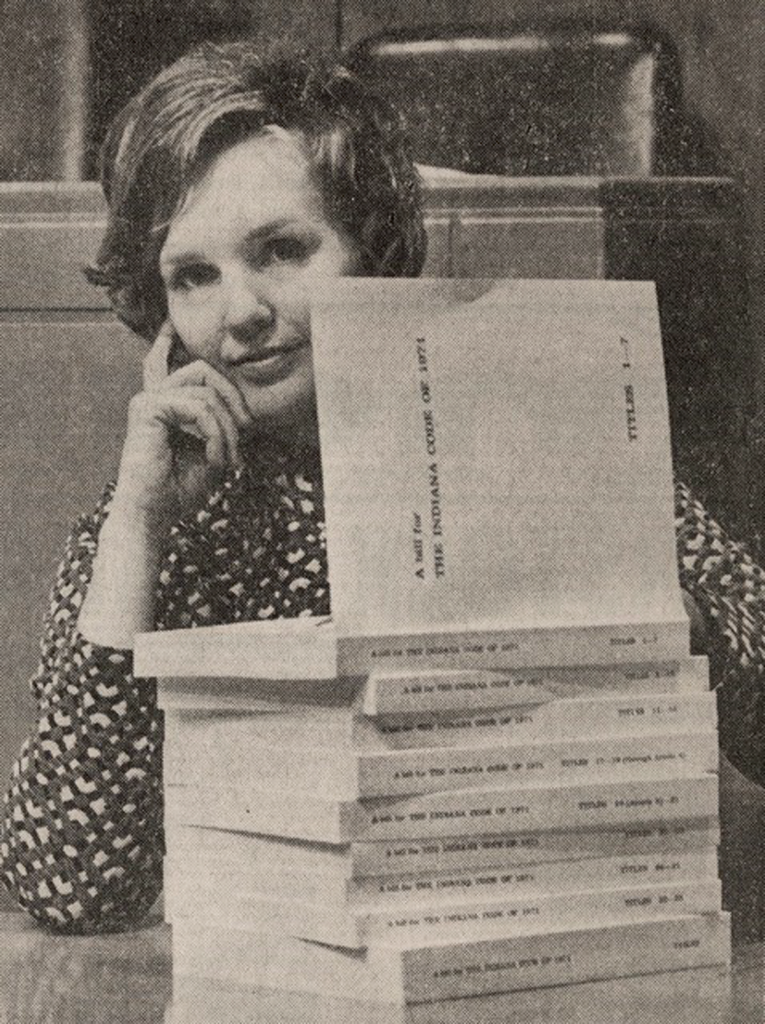Subscriber Benefit
As a subscriber you can listen to articles at work, in the car, or while you work out. Subscribe NowIn 1977, future Bloomington attorney Betsy Greene sat on the floor of the Indiana Senate and watched history being made as Indiana became the 35th state to ratify the Equal Rights Amendment.
The then-20-year-old heard cheers erupt in the chamber gallery and saw tears shed from her birds-eye view. Beth Van Vorst Gray, Greene’s mother, served as secretary of the Senate at the time and silently celebrated the victory on the chamber floor. Her grassroots efforts outside the office to ratify the ERA in Indiana had finally paid off.
“She had worked on this for a very, very long time,” Greene said. “For me, it was incredibly exciting to be a part of; it was meaningful. But it didn’t mean the same for me that it did for my mom.”
Making an impact

Women secured the right to vote in the United States in August 1920 but continued to struggle for equality. In the 1970s, the ERA proposed amending the U.S. Constitution to guarantee equal legal rights for all American citizens regardless of sex.
As Indiana celebrates 100 years of suffrage, Hoosier women are reflecting on the efforts taken by their predecessors to secure equal rights for future generations.
For Greene, that means remembering her late mother’s courage and determination to bring women a step further in Indiana. As a devoted political activist, Van Vorst Gray was knee deep in Indiana’s grassroots movement to ratify the ERA alongside women like Mary Beth Ramey, Virginia Dill McCarty, Betty Barteau and others.
While women had gained the right to vote roughly 60 years prior, the movement for equality wasn’t finished. Efforts to ratify the ERA looked, in part, like actively lobbying at the Legislature, talking to people about the cause and starting petitions and letter-writing campaigns. Their goal was to grant true equality through the ERA, which would in turn amount to equal pay and equal opportunities.
“It was a tireless effort. The reception was not always positive either, I might add,” Ramey said.
Ramey, who was also in the Senate chamber when Indiana ratified the ERA, said there were involuntary tears of joy when the votes were tallied. Everyone pushing for ratification had worked extremely hard to get there, which made the experience even more amazing. But it wasn’t without pushback, Ramey recalled. Although the grassroots movement coursed over a two-year span, the Indianapolis attorney said it felt like an eternity.
“There were people fighting vigorously in opposition. There were women who were fighting in opposition — it was terrible,” Ramey said.
“It was very hard to understand why we were even having the debate,” said Ann DeLaney, of counsel at DeLaney & DeLaney LLC.
Although she was still in law school with two young children during the grassroots movement, DeLaney said she began to realize how far behind Indiana was on women’s equality, particularly in the legal profession.
“I look back on what the suffragettes did and how the 19th Amendment changed things, and it always amazes me that somehow we are still fighting battles like that on other fronts in the 21st century,” she said.
The same is true for Greene, who in 1977 had yet to experience the inequality that made her mother so angry. But as a young lawyer, Greene came to learn that many women experienced – and still experience – discrimination in one form or another.
“I came to appreciate that I was standing on the shoulders of the women who came before me, who fought for the right to practice in the bar, to fight for the recognition in the profession. I realized I was on their shoulders, and I have a responsibility to pay that forward,” Greene said.
‘Not an option’
Senior Judge Sarah Evans Barker of the U.S. District Court for the Southern District of Indiana said while Hoosiers celebrate 100 years of women having the right to vote, there is still work to do.
“What a miracle it was that both women at the time from distant places and different lives, found in that issue a cause that needed to be championed, and then they not only coalesced around it, they empowered each other, encouraged each other, they each took different roles … and it turned out to be an issue around which many different types of women could gather,” Barker said.
“I think that there are lessons all throughout history, but this is a good one, of when people pull together like that on a particular issue, they can succeed in making headway. That was a huge accomplishment.”
What infused the fight for equality 100 years ago are the same values that are being advanced and espoused today, Barker said. “No one should think that the task is finished. It just presents in a different way.”
Tess White, chair of the Indiana Trial Lawyers Association Women’s Caucus, said the centennial anniversary brings home to her the importance of voting as something that shouldn’t be taken for granted.
“I have an 11-year-old daughter, so I have taken her with me (to vote), because it has been important to me for her to see that it this is something that you do,” White said. “It’s not an option.
“I’m not going to let down the women who fought so hard for that right to not have my voice be heard,” she continued. “And how now, more than ever, with how divisive everything is, that it isn’t just a right. It’s a responsibility to ourselves and really, to the women who fought so hard for it.”•
Please enable JavaScript to view this content.

